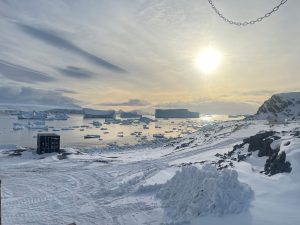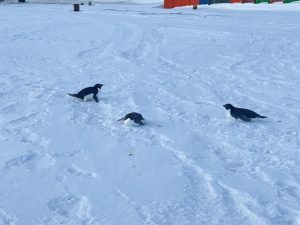05 March 2024 Blogs
In the vast expanse of the Antarctic wilderness, where isolation and extreme conditions are the norm, a small group of individuals stands out as unsung heroes. They are the maintenance technicians responsible for maintaining the sewage treatment plant at Rothera Research Station, a vital outpost managed by the British Antarctic Survey (BAS). These individuals endure the harshest of living conditions, with winter temperatures plunging to bone-chilling levels and the sun barely making an appearance. Yet these dedicated individuals are the silent guardians ensuring the station’s smooth operation and the preservation of the pristine Antarctic environment.
The Polar Regions may be at the ends of the Earth but what happens there affects us all. The BAS is a Government backed initiative and their vision is to be a world-leading centre for polar science and polar operations, addressing issues of global importance and helping society adapt to a changing world.
Home to around 20 individuals during the long winter months and swelling to almost 100 in the summer, the Rothera Research Station is both a centre for groundbreaking science and a testament to the tenacity of its staff. Long-term science projects, international collaboration, and supporting deep-field operations are all part of Rothera’s mission. The unsung heroes who choose to spend their time at Rothera endure extreme conditions, separation from family and friends, and the challenges of isolation.
Sewage maintenance in the Arctic Circle
Key to this mission is the team responsible for maintaining the sewage treatment plant, a crucial part of the station’s infrastructure. It is a task that demands unwavering commitment and expertise. This is where Develop Training’s British Water Wastewater Treatment Plant Maintenance course comes into play.
Every year, the BAS sends 1-2 of their maintenance technicians’ to Develop’s Derby centre to participate in this training programme. The course covers an array of topics, from understanding different sewage treatment plant types to diagnosing and rectifying common faults. This training is not merely a matter of compliance but an absolute necessity for those working in the Antarctic environment. The sewage treatment plant is not only an integral part of the station’s infrastructure, it is critical in preventing pollution and safeguarding the Antarctic ecosystem – a vital component of BAS’s environmental responsibility.
A critical part of infrastructure
The course equips BAS technicians with the knowledge and skills to tackle the complexities of wastewater treatment. They alone ensure that the sewage treatment plant operates effectively, even in the harshest of conditions.
As Rothera transforms from a remote outpost to a hub of scientific exploration each summer, the technical staff’s ability to ensure the smooth running of the sewage treatment plant becomes even more critical. These sewage saviours aren’t just keeping the toilets flushing, they’re quite literally providing the support that enables scientists to conduct studies that expand our understanding of the Antarctic environment and its global impact.
They might not wear capes, but they’ve earned their status as the unsung heroes of the Antarctic!
Get in touch
If you have any questions about our waste water and environmental training then please contact our Customer Service team on 0800 876 6708 or email enquiries@developtraining.co.uk
Alternatively, you can view the full range of available courses here: www.developtraining.co.uk/training/utilities/water-utility













